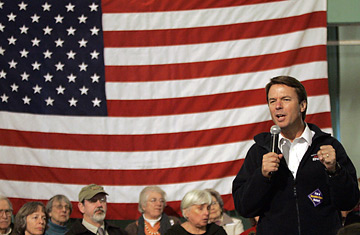
Democratic presidential hopeful John Edwards addresses a Town Hall meeting in Exeter, N.H., Monday, Oct. 29, 2007.
A pitch perfect debate performance, key union endorsements and a bold new television ad campaign: Could this be the moment that presidential candidate John Edwards finally gets some momentum?
Edwards' campaign has seen a surge of online support of late, often a barometer of how well any candidate is doing. They've raised $500,000 in the last two weeks over the Internet, $200,000 of it the day after the Philadelphia debate, at which Edwards was by most accounts the clear winner. Even more importantly, the campaign says 40% of recent donors were new to the campaign. The cash infusion comes on the heels of a series of important union endorsements for Edwards, who trails in overall fundraising behind both Hillary Clinton and Barack Obama by more than $50 million. Edwards has won support from seven Iowa unions — a huge boon to the campaign because it effectively shuts out Obama from bringing in any outside organized labor support. Obama has no Iowa union endorsements; Hillary leads the field with eight.
With just two months to go before the Iowa caucuses, Edwards has a small but definite window to make a move, but it's one he must play very carefully. Come across as too angry and he'll turn voters off. Not angry enough and he remains in Obama's shadow. "There is a mini-primary going on there to become the alternative to Clinton," says Steve MacMahon, a top adviser to Howard Dean's presidential campaign in 2004 who is not affiliated with a campaign this cycle. "As long as there are six others it's very difficult for any one candidate to aggregate those looking for an alternative to Clinton."
Edwards is certainly moving to capitalize on his current buzz. He's launched his first 60-second commercial in Iowa, entitled "Heroes," and is embarking on a five-day bus tour centered on the same theme — average Americans who work and struggle to provide for their families. "If you're looking for heroes, don't look at me. Don't look at Elizabeth. We have support. Look to them. They're the ones we speak for. They are the ones we stand up for," Edwards says in the spot, which features images of "hardworking local Iowans."
Focusing on his own message in the aftermath of his debate success, rather than immediately attacking Clinton, is a smart tactic, says Stephanie Cutter, another Democratic strategist and former adviser to the 2004 Kerry campaign, who isn't working for a campaign this election cycle. "If someone's going to make a move in this election, now's the time to do it," Cutter says. "Being aggressive is one thing. Going on a full-scale attack is another. Edwards tried to position himself as the outside Washington truth-teller. He's got to be careful how he goes after his opponent because the attacker rarely wins in early caucus states."
Edwards's reemergence started at the liberal bloggers' Yearly Kos convention in August, where the former North Carolina senator called on all Democrats running for president to renounce funds from lobbyists. But his real target was frontrunner Hillary Clinton. And he hit his mark — forcing the former first lady to essentially defend lobbyists as "real Americans."
In the months since he has continued to pound away on that point, adding to it his criticism of her refusal to apologize for her Iraq war vote (Edwards long ago asked for forgiveness on that same vote) and her support last month of a resolution calling on President Bush to label as terrorists the Iranian Revolutionary Guard Corps. He has also come out swinging on other policy matters — voicing his opposition this week to a bipartisan bill to limit greenhouse gas emissions, which he says doesn't go far enough, as well as to the Peru Free Trade Agreement before Congress right now. He's also proposed legislation that would ban for two years the advertising of new drugs, and also supports a West Point-like academy for teachers and a plan to limit security contracting in Iraq.
Edwards "has been drawing very clear contrasts and defining the choice that voters face in the campaign, but it's crystallized in the last few weeks," says Mark Kornblau, senior communications adviser to Edwards. "He's been doing so more forcefully than anybody on either side of the race. Still, delivering the message took a cumulative effect to where people are paying attention."
Yet being so far behind in the money race — Edwards moved to accept public funding last month after initially saying he would not — remains a liability. "If he wins in Iowa, will he have enough money or be able to raise enough money to stay competitive over the next weeks after that?" asks Jamal Simmons, a Democratic consultant, who is also not working on any current presidential camapigns. "Obama still has the media attention, still has the sex appeal and he doesn't have to raise money if he wins." As Edwards partisans are quick to point out, his campaign may not be as flush as Clinton's or Obama's, but he does have $12 million cash-in-hand. And as John Kerry showed in 2004, a win in Iowa can do wonders for a campaign's finances.
Despite the fact that he was the party's vice presidential nominee in 2004, in a race against Clinton and Obama, two lavishly funded celebrity candidates, Edwards remains an underdog. "What Edwards has got to do is really thread the needle," says Mike Feldman, a former Gore adviser, who isn't affiliated with any of the campaigns. "It's possible [for him to win]. But what you see in his urgency in making his case is that time is running out."
